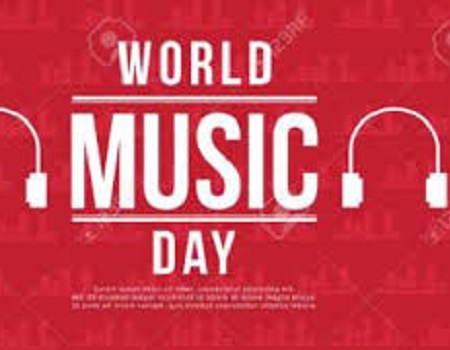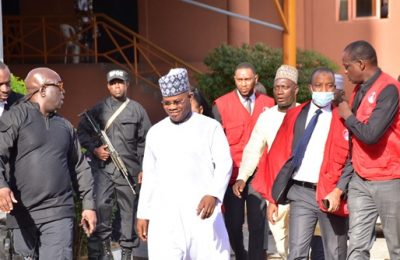By: Adeyombo Aderinto
There has always been something supremely universal about music in that it deals with human emotions. More succinctly, it underlies our commonalities and humanity more than anything else. In its comprehensive make-up—vocals, assortment of instruments, rhythms, melodies—it stimulates all response centers of the human brain, unfailingly eliciting a range of emotions that may include sadness, happiness, as well as urges of inspiration, creativity, and philanthropy. In its full capacity to rouse and excite, it is almost spiritual—colorless, borderless and completely human.
For something as powerful and influential as music, it is perfectly in order to have a day of dedication and celebration to mark its prowess and entrenched significance in our lives and humanity.

June 21st all over the world is World Music Day and hence, from our part of the world, here is to World Music and its capacity as a reflective and projective medium, allowing us to see our past as we look into the future, stimulating us to cry or laugh and be moved into actions when the events of our lives seem to undermine our humanity, and finally making us realize that our vast world is just a speck that is home to all of us (Neil de Grasse Tyson, astrophysicist) in more ways than one, especially in the universality of our ties.
There has always been that anthropological characteristic of music—its cross-cultural capacity and dynamism, inarguably induced by our inclinations as humans to adopt that which is aesthetically appealing as it manifests itself in our customs and culture. However, it was not until the seventies that world music got its label, name or identity.
Music has always been an aspect of human experience perhaps dating back to human origin. It is unique to different groups of people in different forms based on their experiences, emotions, and culture. Music, however, did not become cross-cultural until people started to travel or move away from home, taking their culture with them, including their music.
Over time, the experiences, culture, and music of the new place melded with the native brand, consequently creating a new brand that featured elements of both old and new. This is best, quite sadly, illustrated with the Trans-Atlantic Slave Trade, which resulted in forced settlement of African people in the United States and elsewhere around the world.

On the plantations in the States, the old African folk/traditional songs, heavily influenced by and nuanced with the painful experiences of the slaves, became spirituals. Spirituals would later find a home at the church and, with the guitar, keyboard and drums added, became gospel music.
From gospel emerged the blues, a bit more secular than gospel and more detailing of experiences away from the church in personal narratives dealing with relationships and challenges of everyday life. Somewhere between spirituals and blues, jazz came along with some residual elements of its predecessors but quite heavy on instrumentation and the freedom of expression of such—improvisation.
Around mid -20th century, rhythm and blues, soul, as well as rock and roll, all evolved from their progenitors and would soon become more resonant around the world than their forebears. Disco-–yes disco–happened in the seventies, and so did hip hop—both divergent in their orientation with the disco representing joie de vivre and hip hop presenting the rebellious or “discordant” voice of the urban youths in an assortment of social commentaries. While disco has faded today, hip-hop has blossomed, strongly mainstreaming itself the world over.
Music progression or evolution in Africa, not unlike that in the United States or elsewhere, started with traditional music chronicling personal and collective experiences of people in general—sometimes ceremonial, heavy on vocals, light on instrumentation–except for the drum–and outright unplugged. As time passed, the guitar was added in the urban context, giving our traditional music a more robust flare. In its new form, this brand of music became plugged and, perhaps for marketing purposes and because of its ceremonial leaning, got its name—juju.
Names that could be associated with juju include Julius Araba, I.K Dairo, Dele Ojo and others, with the global flag bearer being King Sunny Ade. Around the time that juju was affirming itself in Nigeria, high-life also found its way to Nigeria from Ghana as elitist, slow-paced, even-rhythmed, brass-laden dance music. The hub, of course, was Lagos with a spillover effect in outlying areas of the country. The genre would later have its own Nigerian sensibilities in that it became less formal, a bit more buoyant and perhaps less elitist.
Flying the high-life flag in the early days were Bobby Benson, Victor Olaiya, Adeolu Akinsanya and, much later, Fela Kuti and Orlando Julius. Quite distinct was Fela’s brand of high-life, especially with its stylistic, catchy, and cerebral horn arrangements. Maintaining his signature horn arrangements, Fela would later develop the Afrobeat–a genre on its own packing more punch with its virulent bass and Tony Allenesque drumming, as well as its superimposed social commentaries.
Origins of Afrobeat could be traced back to not only high-life but also to soul and funk, as well as other sixties vibes in the United States, with influences far flung and sometimes reciprocal—Africa first influencing the world and the world influencing Africa later.
So far, the Nigerian music artistry has been best represented on the world stage by Afrobeat and juju. Created by Fela and now sustained by his children, Tony Allen, and others, Afrobeat is influencing other genres or sub-genres of music all over the world, especially with its pleasantly rhythmic bass riffs.
Adeyombo is an avid music lover and writes from Lagos.
Read Also: No Nigerian university can afford new electricity tariffs — ex-UNILAG VC, Ogundipe







